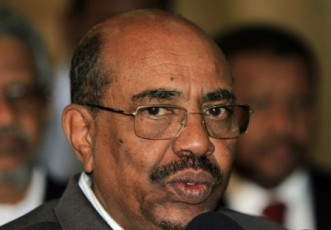Bashir admits Sudan’s grim economic situation
October 10, 2011 (KHARTOUM) – The Sudanese president Omer Al-Bashir has acknowledged that his country is facing straitened economic circumstances, blaming them on the international crisis and loss of oil revenues due to South Sudan’s secession.

Officials of the ruling National Congress Party (NCP), including Al-Bashir, have sought to assuage public fears by downplaying the impact of South Sudan’s secession on the economy.
But public discontent over worsening economic conditions recently began to manifest itself in small protests which the authorities have managed to contain so far.
In an address to the parliament on Monday, Al-Bashir admitted that the secession of South Sudan has left an indelible mark on Sudan’s economy, reaffirming the government’s intention to implement a set of policies to mitigate the economic hardships experienced by citizens.
He went on to say he had instructed the competent authorities to tighten control of the markets and combat monopoly and speculations in order to curb increases of prices.
“Our next year plan is geared towards maintaining economic stability and compensating the loss of oil revenues through the development of agriculture, minerals and electric power”, he explained.
Earlier this year, the Sudanese government approved an austerity package that partially removed subsidies on sugar and petroleum products with further cuts expected to follow.
Al-Bashir said his government is continuing efforts to persuade Western countries, particularly the United States, United Kingdom, and Norway to help Sudan to overcome the economic chasm it was experiencing.
Sudan’s foreign minister Ali Karti said last month in Paris that the country’s economy faces collapse unless the international community steps in to provide assistance in the area of debt relief.
Karti, who described his country’s economic woes as “really serious”, said that Sudan’s debt servicing incurs more than $1 billion annually.”
Sudan’s external debt stands at $36.8 by December 2010, according to the International Monetary Fund (IMF) which last month projected a negative real GDP growth for Sudan; -0.2% in 2011 and -0.4% in 2012.
In his speech, Al-Bashir stressed the importance of fighting corruption and adopting transparency and accountability as means to reform the state.
Sudan remains without an anti-corruption authority despite Al-Bashir’s previous promises to establish it.
The country’s former Justice Minister Abdel-Basit Sabdarat said that the government relies on “religious piety” of state officials in fighting corruption.
(ST)
